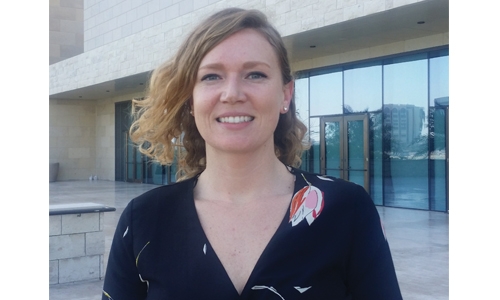DLT for faster, no-cost fund transfer
Manama : Cost of cross-border transactions could go down dramatically while also reducing the time taken for the transfer of money if a new technology is implemented, according to an expert.
Sending money from one country to another can be made “almost at no cost” and “instantaneously” if Distributed Ledger Technology (DLT) is utilized, said Lisa Nestor, Director of Partnerships at Stellar. The US-based Stellar, a non-profit organisation, is a platform that connects banks, payments systems and people. The organisation works around the world, especially in developing countries, to help people move money quickly and at minimal cost.
“The technology, if implemented by financial institutions, will help individuals and organisations send money at fraction of the remittance cost. Money transfer, even large sums between countries and currencies, will become instantaneous,” Nestor told DT News, explaining how the economy of the GCC and the world can be lifted by implementing the technology.
“The goal is to enable interoperability between different financial systems. When you are able to solve the problem of interoperability between different payment networks, you make it much more efficient and low cost in order to move money around the world. This technology makes it so that you do not need intermediates who only slow down the transaction process and increase the costs. This technology can be used to exchange any currency or any assets such as stocks and mutual funds,” she said.
“A lot of countries have decent domestic clearing houses, sending money between banks within the country that takes just a minute. But, for example, moving money from Bahrain and UAE can take a lot longer and cost more. However, this new platform allows you to do instantaneous exchange between those currencies and between two countries. Also what is exciting about it is that it allows for interoperability between banks and non-banking financial institutions, which means it’s not just a system where only banks will have a faster way to send money to other banks but also to other systems such as the M-Pesa accounts.”
She said the Stellar is focusing on countries including the GCC nations, Philippines, India and nations in West Africa region.
“We are very focused on emerging markets because the costs of sending payments there is particularly high. So we want to focus on places like the Gulf region, India and Philippines - which are huge remittance destinations from the Gulf region and Africa.”
Being a non-profit will help the financial institutions trust them, she said. “The fact that we are a non-profit is also strategic because what we are trying to do is to build a network, and networks becomes increasingly valuable when they are adopted more. A good example is the internet. If the internet would have been a business made for profit, people may not have adopted so quickly and widely. If somebody had charged users to send messages or to use a search engine, people may not use it as much. So in order to achieve the scale the best strategy is to have a non-competitive strategy as a non-profit where you do not have conflicts of interests. We are a mission-oriented organization, we want to serve not just the banks, but also the underbanked people, so that a person in Nigeria doesn’t have to spend tremendous amounts of money to send money to his cousin in Kenya. We get very excited about taking this technology all over the world and change the economic reality for everyone,” said Lisa.
She said she has held talks with financial institutions in Bahrain as well as the Economic Development Board. “We have been working with the Bahrain Economic Development Board, they have been incredibly supportive to us. Our goal in Bahrain is firstly to educate the financial industry here about this technology. The second goal is to start forming partnerships with payment companies and banks here so that they can utilize this technology,” she said.
“The goal is that in the future, five years from now, sending a payment will be like sending an email. The world and the economy would be a much better place for everyone if moving money is easy,” she added.
Related Posts

